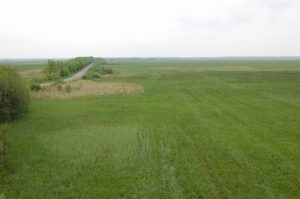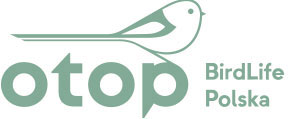A brighter future for Europe’s rarest migratory songbird
Oficjalna zmiana siedziby OTOP
13 grudnia 2011
Ptaki, zimno i zima – spotkanie Warszawskiej Grupy OTOP
15 grudnia 2011The Aquatic Warbler is facing a brighter future, thanks to the results of six years of intensive work within an EU LIFE project coordinated by OTOP-BirdLife Poland, which have recently been presented in Warsaw/Poland.

“The Aquatic Warbler is a habitat specialist, intrinsically linked to peatlands fed by groundwater, so-called fen mires. Protecting this bird means, we are saving all the other rare fen mire species represented by this flagship species”, explains Lars Lachmann, the project coordinator working for OTOP and RSPB, BirdLife in the UK, a partner in the project.
In the last century, all but a very few fen mires in the species’ European range have been drained for agriculture or peat extraction, causing the catastrophic decline that led to the species being classified as “globally threatened”. A quarter of the world population survived in eastern Poland, and another small and isolated group of birds along the Polish-German border.
Today, the biggest threat for the few remaining fens is that they become overgrown with dense reeds and trees. In the past, this process was impeded by the use of extensive traditional hand scything. When this practice ceased for economic reasons, open fen mire vegetation started to disappear, and with it Aquatic Warblers and breeding waders like Black-tailed Godwits, Redshanks and Lapwings. Even the establishment of a National Parks, e.g. in the famous Biebrza Valley, could not revert this process.
This is where the project came in to catalyse a landscape-scale solution for the restoration and sustainable management of peat meadows, introducing a purpose-built prototype mowing machine, based on an alpine piste-basher on caterpillar tracks, with very low ground pressure and fast working speeds (up to 10 hectares per day). This machine does not destroy the delicate peat soil and vegetation. More than 30 of these machines now keep 15,000 ha of Aquatic Warbler habitat open in Poland. The technique has already been exported to Germany and Belarus.
OTOP also arranged for suitable agri-environment schemes paying farmers for Aquatic Warbler friendly management and made land available for conservation through the purchase of three new reserves. National Parks leased out their land in need of active management to farmers using the new machines. Currently, OTOP and partners are setting up a system to convert the large amounts of low-quality hay harvested on these sites into carbon-neutral biomass briquettes and pellets, helping to protect the climate and to finance habitat management for Aquatic Warblers, at the same time creating green business opportunities locally.

“We are very pleased to see the return of large numbers of waders, including Jack Snipes and Wood Sandpipers not seen in Poland for over 10 years, but the key success of this LIFE Project is of course that the Aquatic Warblers are readily returning to the areas we have restored for them.”
The 5m €-project has been implemented with funds from the EU LIFE Nature Programme. Additional co-financing was provided by RSPB, Swarovski Optik and Cemex Poland.
Written by OTOP for http://www.birdlife.org

